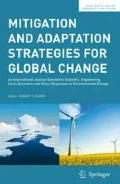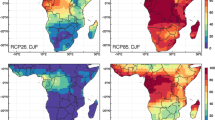Abstract
This paper discusses the conceptual basis for linking development policies and climate change adaptation and mitigation and suggests an analytical approach that can be applied to studies in developing countries. The approach is centred on a broad set of policy evaluation criteria that merge traditional economic and sectoral goals and broader social issues related to health and income distribution. The approach is inspired by institutional economics and development paradigms that emphasise human wellbeing, resource access, empowerment, and the arrived freedoms. It is outlined how indicators of wellbeing can be used to assess policies that integrate development and climate change policy objectives, and this approach is discussed in comparison with other work that rather have been inspired by sustainable development aspects of manmade, natural, and social capital. The experiences and results from case studies of development and climate that have done a first attempt to use human wellbeing indicators are reported and discussed. The studies include work from India, China, South Africa, Brazil, Bangladesh, and Senegal. A number of policy examples in the energy-, food-, and water sectors in these studies have shown up to demonstrate numerous linkages between development policies and climate change. Various analytical tools have been used in the studies including quantitative and qualitative scenario work as well as detailed micro-based analysis. The methodological conclusion that can be drawn from these studies, is that it is possible to apply wellbeing indicators to the more detailed policy assessment, but a link to more general national and regional scenario work is not yet established.
Similar content being viewed by others
Notes
The same limitations characterise the more general literature on sustainable development, where studies of social and human capital are still not as well developed and operational as studies of manmade and natural capital.
The Development and Climate studies are carried out by a network of 12 institutions from developing countries and industrialised countries. For more information, please see http://www.developmentfirst.org
References
African Development Bank et al (2003) Poverty and climate change. Reducing the vulnerability of the poor
BCAS (2003) Bangladesh country case study. Accessed 05.01.2006 at http://www.developmentfirst.org
Dasgupta P (1993) An Inquiry into wellbeing and destitution. Oxford University Press, New York
Davidson O, Halsnæs K, Huq S, Kok M, Metz B, Sokona Y, Verhagen J (2003a) In: Munasinghe M, Downing TE (eds) The development and climate Nexus: the case of sub-Saharan Africa, Climate policy, vol 3, Supplement 1, p 97–113. Special Supplement on Climate Change and Sustainable Development
Davidson O et al (2003b) ‘South African energy futures: visions, driving factors and sustainable development indicators.’ Internal project report for Phase I of the sustainable development and climate change project. Energy & Development Research Centre, University of Cape Town, South Africa
Jiang K et al (2003) The development and climate. Country Study, China, forthcoming
Indian Institute of Management, IIM (2003) Development and climate. An assessment for India, Ahmedabad, India. Accessed 04.14.2006 at http://www.developmentfirst.org
Indian Government (2004) Vulnerability assessment and adaptation, Chapter 3. In: India’s Initial National Communication to the United Nations Framework Convention on Climate Change, Ministry of Environment and Forests, Government of India
IPCC (2000) Special report on emission scenarios. Cambridge University Press
IPCC (2001a) Climate change 2001: Vulnerability and Adaptation. Contribution of working group II to the third assessment report of the intergovernmental panel on climate change, Cambridge University Press
IPCC (2001b) Climate change 2001: Mitigation. Contribution of working group III to the third assessment report of the intergovernmental panel on climate change, Cambridge University Press
IPCC (2002) Climate change 2001: Synthesis report. Cambridge University Press
Halsnæs K, Markandya A (2002) Analytical approaches for decision-making, sustainable development and greenhouse gas emission-reduction policies. In: Markandya A, Halsnæs K (eds) Climate change and sustainable development. Prospects for developing countries. Earthscan Publications Ltd., London, pp 129–162
HalsnæsK, Verhagen J, La Rovere E, Klein R, Huq S (2003) Linkages between development and climate change, development and climate project
Meier GM (2001) The old generation of development economists and the new. In: Meier GM, Stiglitz JE (eds) Frontiers of development economics. The future in perspective. The World Bank and Oxford University Press
Olhoff A (2002) Assessing social capital aspects of climate change projects, chapter 4. In: Markandya A, Halsnæs K (eds) Climate change and sustainable development. Prospects for developing countries. Earthscan Publications Ltd., London, pp 129–162
Peet R, Harwick E (1999) Theories of development. The Guilford Press, New York
Rovere ELL et al (2003) The development and climate project. Phase 1. Country Study: Brazil. Zero Draft, Centre of Integrated Studies on Environment and Climate Change
Sen A (1999) Development as freedom. Oxford University Press
Sokona Y et al (2003) The development and climate. Country study: Senegal. Third Draft, Environnement et Développement du Tiers Monde, Senegal
World Bank (2001) Poverty reduction source book, overview p. 2. Accesssed at http://poverty.worldbank.org/library/view.php?topic = 3438&id = 8124
Yohe G, Moss R (2000) Economic sustainability, indicators and climate change. In: Munasinghe M, Swart R (eds) Climate change and its linkages with development, equity and sustainability. Proceedings of the IPCC Expert Meeting in Columbo, Sri Lanka 27–29 April 1999, IPCC and WMO Geneva
Yohe G, Tol R (2002) Indicators for social and economic coping capacity—moving toward a working definition of adaptive capacity. Glob Environ Change 12:25–40
Author information
Authors and Affiliations
Corresponding author
Rights and permissions
About this article
Cite this article
Halsnæs, K., Verhagen, J. Development based climate change adaptation and mitigation—conceptual issues and lessons learned in studies in developing countries. Mitig Adapt Strat Glob Change 12, 665–684 (2007). https://doi.org/10.1007/s11027-007-9093-6
Received:
Accepted:
Published:
Issue Date:
DOI: https://doi.org/10.1007/s11027-007-9093-6




